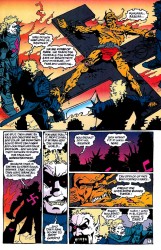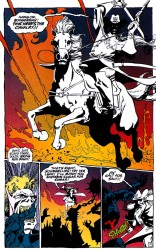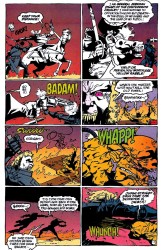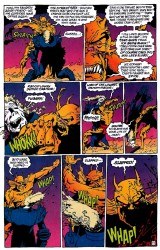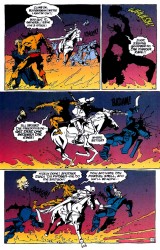
Black Future Month ’10: Proclamation
February 2nd, 2010 Posted by david brothers“It is what it is” is a phrase that signifies resignation or a grudging acceptance of a situation. It’s not admitting defeat, not exactly. Really, it means exactly what it says. Whatever situation you’re in is whatever situation you’re in. You can’t change the past and you can’t change the present. All you can do is live in it. Fantasy only goes so far, and “so far” in this equation is “nowhere.”
I read a story in a comics anthology a few weeks back that really surprised me. It’s short, just seven pages, but it bounced around in my head for days after I finished it. In it, a man named Tarlton is in charge of inspecting the robotic citizens of Cybrinia to see if they are ready to be accepted into the Galactic Republic.
He meets an orange robot soon after landing on the planet, and this robot serves as his guide around the planet. Tarlton is shown their factories, their system of government, their educational system, and their technology. He asks about the blue robots, and is told that they live on the south side of the city.
Tarlton learns that the citizens have self-segregated, with the orange robots living in relative opulence, while the blue robots must live a harder life. He visits a blue factory and notices that the blue robots have the same innards as the orange robots. His orange guide bristles at Tarlton’s anger. “You are lecturing me as though all this were my fault, Tarlton! This existed long before I was made! What can I do about it? I’m only one robot!”
Tarlton storms out of the factory and back to his ship. He explains that the robots are on their own until they learn to live together in harmony, and that they won’t see real progress until they do so. He climbs back inside his ship, bids his guide farewell, and lifts off. Inside the safe atmosphere of his ship, he removes his helmet, and the narration describes how the instrument lights make the “beads of perspiration on his dark skin twinkle like distant stars.”
Pretty simple, right? Maybe a little ham-fisted in its use of metaphor, but it has a good message at its heart. The thing is, Al Feldstein wrote it and Joe Orlando drew it in 1953 for EC Comics. They named it Judgment Day. Thirty years after that, Guy Bluford became the first black American in space. Twenty-five years after that, Barack Obama became the first black president.
What struck me was how similar the moral of Judgment Day is to the way race is treated in modern day superhero comics. Like the story set in the far-flung future, superheroes exist in a world where acceptance is the default. The X-Men, long-time stand-ins for various peoples, are indistinguishable from the population at large. They only encounter racism in stories specifically geared to show that racism is something bad people do.
Most black superheroes, the ones worth reading about, at least, pay lip service to the idea of race. They tend to have “Fight the power!” motivations, embody the “angry black man” stereotype, or both. They fight racists disproportionately often when compared to their white compatriots. Their motivations might not be as pure as their brethren.
Some black characters, like John Stewart or James Rhodes, are permanent sidekicks. They aren’t as popular as their white counterparts and never manage to rise above their sidekick status. If they weren’t fictional, you could say that they never manage to self-actualize, no matter how many times they fall out with their benefactors.
Others, like Luke Cage or Misty Knight, are their own characters, but that proves to be their doom. Without some kind of tie to another franchise, they can’t keep their head above water. They are guest stars and cameos, showing up when someone needs a crowd shot or a reference to a character’s friends.
There are a number of reasons why this tends to hold true for so many characters, but that’s not the point today. The point is that today, almost sixty years after Judgment Day told us that racial unity is the future, superhero comics are still singing that same song.
We don’t see the nuances or cultural traits that combine to define a race. We don’t see how the races interact and intersect. In superhero books, race, and everything to do with it, is a binary construct. Villains can be racist, heroes are not. Black characters are unquestionably accepted and called equals, even if the story or art suggests otherwise.
Race is not, and has never been, as simple as black and white. People aren’t that simple. That’s just not how it works.
There’re three bars from a Saul Williams song called “Coded Language” that are applicable here.
Your current frequencies of understanding outweigh that which as been given for you to understand.
The current standard is the equivalent of an adolescent restricted to the diet of an infant.
The rapidly changing body would acquire dysfunctional and deformative symptoms and could not properly mature on a diet of applesauce and crushed pears.
Judgment Day was controversial in 1954, when it was reprinted in Incredible Science Fiction #33. The Comics Code Authority wanted the race of the astronaut changed to white. William Gaines, publisher of EC Comics, stuck to his guns and defied the Code.
It’s 2010. What was controversial then is par for the course today. Interracial relationships are more common than black-on-black relationships in mainstream comics. Captain America’s history bears the specter of experimentation on black men. Luke Cage has been leading the Avengers for a few years. We are standing on the shoulders of giants, looking out at the future, but we’re still eating applesauce.
Of course, applesauce isn’t all we have. There’s a lot to appreciate and a lot to love. I spent a lot of time thinking about BHM10. Several months, in fact. When I sat down to really plan what I wanted to talk about, and how I wanted to talk about it, I was faced with a choice. I can either continue to mourn and wish things were different, or I can accept that it is what it is and move on to the next one. I chose to move on.
Moving on doesn’t mean ignoring the past. Far from it, I think. A few of the essays may cover ground I’ve stomped on before, but hopefully from a fresh angle. I’m gonna talk to people creating the new hotness. I’m gonna talk about black heroes, and yeah, about black superheroes, too. I’m gonna talk about stuff you should be reading and creators you should be watching. I’m looking at three a week, Tuesday-Thursday-Saturday, though that may alter as the month goes on.
This is Black Future Month ’10. I hope you like it.

